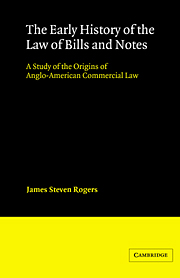 The Early History of the Law of Bills and Notes
The Early History of the Law of Bills and Notes Published online by Cambridge University Press: 22 September 2009
Lord Mansfield and the other judges who participated in the development and systematization of the law of bills and notes in the eighteenth century did have one significant advantage. They were working in a period of great prosperity and expansion in trade, finance, and industry, when there seems to have been little disagreement over the general policies that the legal system should adopt toward commercial affairs. That is by no means the universal condition. We have seen that in the sixteenth and early seventeenth centuries, there was considerable controversy about the economic and moral issues posed by developments in financial techniques. At the end of the eighteenth and beginning of the nineteenth centuries, the English courts were faced with a some-what similar problem. A financing device long considered legitimate and desirable was adapted – or perverted – to uses deemed improper under prevailing financial mores. This chapter explores the complex relationship between legal issues and controversies concerning economic policy and morality that lie beneath the surface of a body of seemingly dry, technical issues about ‘accommodation bills’.
THE LIVESEY BANKRUPTCY AND ACCOMMODATION BILLS
In the year 1788, the firm of Livesey, Hargreaves & Co. of Lancashire went bankrupt. The firm was one of the largest cotton manufacturing enterprises that developed in the early stages of the Industrial Revolution in England.
To save this book to your Kindle, first ensure [email protected] is added to your Approved Personal Document E-mail List under your Personal Document Settings on the Manage Your Content and Devices page of your Amazon account. Then enter the ‘name’ part of your Kindle email address below. Find out more about saving to your Kindle.
Note you can select to save to either the @free.kindle.com or @kindle.com variations. ‘@free.kindle.com’ emails are free but can only be saved to your device when it is connected to wi-fi. ‘@kindle.com’ emails can be delivered even when you are not connected to wi-fi, but note that service fees apply.
Find out more about the Kindle Personal Document Service.
To save content items to your account, please confirm that you agree to abide by our usage policies. If this is the first time you use this feature, you will be asked to authorise Cambridge Core to connect with your account. Find out more about saving content to Dropbox.
To save content items to your account, please confirm that you agree to abide by our usage policies. If this is the first time you use this feature, you will be asked to authorise Cambridge Core to connect with your account. Find out more about saving content to Google Drive.